Korean Cosmetics Ingredients Trend
Growing interest in vegan, upcycled ingredients,
as well as single-ingredient products made of microbiome.
Korean consumers read through the list of ingredients thoroughly before buying a cosmetics product. They make their purchase after checking whether the product contains harmful ingredients, how much of an active ingredient is in the product, and such. According to ‘Beauty Trend Report 2023’ published by Open Survey, a mobile research institution, substantially more Korean consumers take product effectiveness (52.6%) than brand awareness (8.7%) into consideration when buying skincare products. Some other factors they consider are how it feels on the skin (37.1%) and whether it contains mild ingredients (17.7%). As for makeup products, a high proportion of people consider effectiveness (49.6%) and how it feels on the skin (49.3%) as the most important aspects. As such, ingredients play a key role in cosmetic purchases.
COVID-19 has only made this trend more prominent. More consumers now prefer intensive care, such as strengthening skin immunity and skin barrier, and providing calming, hydration, and firmness care to their skin. Products that contain skin-derived microbiome ingredients that boost skin immunity and skin barrier are becoming increasingly popular, and products that contain a single but powerful active ingredient are also seeing a rise in demand.
With the clean beauty syndrome that has dominated the market, products that contain vegan or natural ingredients are also gaining a larger market share. Sustainable upcycled ingredients are likewise becoming more commercialized.
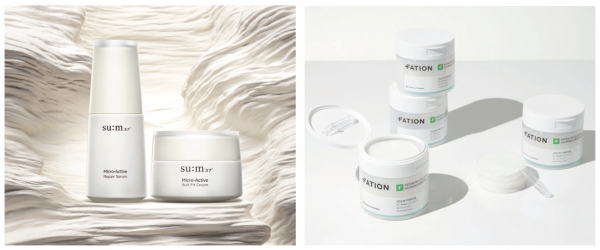
Increased popularity for microbiomes that strengthen skin immunity
As more consumers place an emphasis on skin immunity and health, the type of product that is receiving the biggest spotlight is probably those that contain skin-derived microbiome ingredients. Microbiome refers to the community and genome of microorganisms that coexist in animals and plants, including humans, the soil, the sea, and the air. The current application of microbiome in cosmetics focuses on scientifically identifying the relationship between microorganisms and skin based on a genome analysis of microorganisms existing in the skin environment, which is what makes it different from fermented products that contain intestinal lactic acid bacteria or microorganisms, such as probiotics and prebiotics. Microbiome products activate the beneficial bacteria present in the skin to increase skin immunity and find a stable skin balance.
Korean companies are leading the global technology trend in the field of microbiome cosmetics. OEM/ODM companies as well as top manufacturers and raw material companies, from COSMAX, Kolmar Korea, Amorepacific, LG Household & Healthcare, Hyundai Bioland to GFC Life Science, are establishing their own research bases and applying their research findings to cosmetics. Bio specialists, including Genome & Company, KoBioLabs, Chun Lab, and Cell Biotech, are expanding their business portfolio into the cosmetics industry.
In particular, COSMAX positioned itself as the leader in the market when it became the first company to develop ‘anti-aging microbiome cosmetics’ in April, 2019. This was the outcome of research the company had conducted on the relationship between anti-aging and microorganisms and scientifically proving the mechanism of inhibiting cellular aging using specific microorganisms. COSMAX has also released a follow-up product that uses NASA's space bio microbial material (Solar Biome™).
More cosmetic products now use microbiome. IOPE, HERA, Sum37˚, Illiyoon, Ohui, Tonymoly, Manyo Factory, Mediheal, Dr. Jart+, AHC, Leaders Cosmetics, and Age20s are among the brands that are pioneering the market with their microbiome products. Pharmaceutical companies are also creating brands to enter this blue ocean. Some of these are ‘First Lab’ by Ildong Pharmaceutical, ‘Dr. Lacto’ by Chong Kun Dang Healthcare, ‘Procam’ by Hanmi Pharmaceutical, ‘Fation’ by Dong-A Pharmaceutical, and ‘Centellian24’ by DongKook Pharmaceutical.
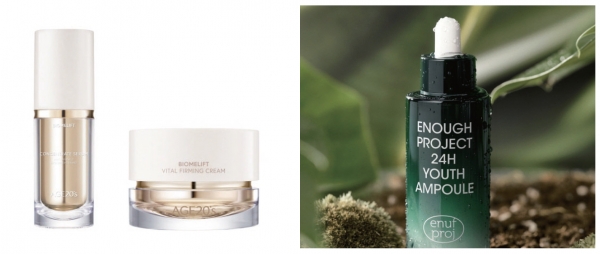
Key active ingredients replaced with vegan alternatives for a unique competitive edge
The clean beauty craze has given rise to an increasing demand for plant-based ingredients. In particular, the number of vegan plant-derived products is growing. Clean beauty refers to using eco-friendly ingredients derived from nature without the use of harmful ingredients, such as parabens. Vegan cosmetics are made without animal testing, do not contain animal-derived ingredients, and are made of plant-based ingredients.
Unlike non-vegan cosmetics, vegan cosmetics use plant-based ingredients to deliver their key benefits. Some of the most widely used ingredients are bakuchiol, nicknamed vegetable retinol, and vegetable PDRN. Bakuchiol is an anti-aging ingredient extracted from the leaves and seeds of a medicinal plant that grows in India, and has proven anti-inflammatory, antibacterial, and antioxidant effects. Above all, it is rapidly emerging as an alternative to retinol as it is relatively less irritating than retinol, which has been used extensively as an anti-aging ingredient. Amorepacific's ‘Enough Project Moisturizing Cream’ and ‘24H Youth Ampoule,’ Gowoonsesang Cosmetics' ‘Vividdraw Cherry Collagen Firming Capsule Ampoule,’ Marie&May's ‘Vegan Peptide Bakuchiol Sun Stick,’ Haru Haru Wonder's ‘Black Rice Bakuchiol Eye Cream,’ Tinazana's ‘Vegan Bakuchiol Firming Serum,’ and Viegano's ‘Bakuchiol + Tocopherol Vegan Revitalizing Serum’ all use bakuchiol as their key ingredient.
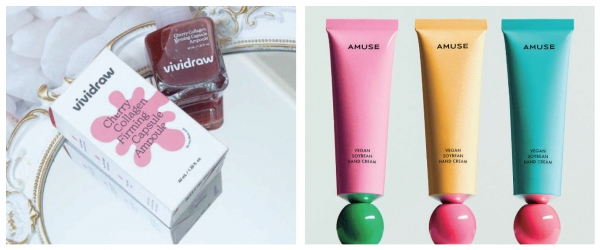
Plant-derived PDRN replaces animal-derived PDRN, which is sourced mainly from salmon, with PDRN extracted from plants, such as seaweed. PDRN is one of the naturally occurring nucleic acid decomposition products in biological tissue and it helps with tissue regeneration and recovery. Plant-based PDRN ingredients can be found in products like Sidmool's ‘Phyto PDRN Ampoule’ and Frebits' ‘Bio Lifting Ampoule.’ Charmzone Cosmetics announced that it will be jointly developing vegan cosmetics containing seaweed-derived PDRN with the National Marine Biodiversity Institute of Korea, with the goal of launching their first product in the first half of 2024.
Ingredients that replace squalene extracted from sharks with vegetable squalane (phytosqualane) extracted from olives, rice bran, malt, and amaranth seeds, as well as vegetable mucins extracted from okra instead of snails are also being used in vegan cosmetics.
d’Alba uses ‘Triferol™,’ the brand's proprietary firming ingredient that combines Italian white truffle with tocopherol, as the key ingredient in all of its products, while Amuse uses soybean (soybean ceramide, pea extract, lentil extract), a vegan superfood, as a key ingredient in its ‘Wellness Vegan Soybean Hand Cream.’ The vegan makeup brand ‘Dear Dahlia’ uses Ecocert-certified dahlia flower extracts in all of its products to deliver skin conditioning benefits, and AROMATICA's products all contain natural essential oils, such as rosemary oil.
The ‘ReXRe Kombucha Variome Line,’ a vegan cosmetics product by Hyundai Bioland, a raw material company, contains ‘Kombucha Variome™,’ the company's proprietary ingredient developed using kombucha, a type of fermented tea that is beneficial to health. According to the company, the beneficial bacteria extracted during the kombucha fermentation help strengthen the skin barrier.
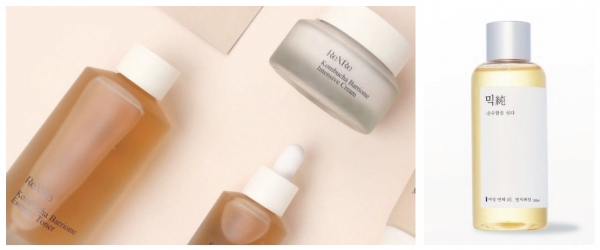
A growing minimalist trend leads to the emergence of single-ingredient cosmetics
The demand for single-ingredient cosmetics that reflect the minimalist trend is also continuing. One of the key characteristics of these products is that they contain a key single active ingredient that delivers essential benefits while minimizing irritation.
Amorepacific's ‘Vintage Single Extract Essence’ contains only pure vintage green tea, and ‘Hanyul Third Year Mugwort Soothing Essence’ is made 100% of 3-year-old mugwort extract, delivering the soothing benefits of three-year-old mugwort from Ganghwa Island. Missha’s ‘Sweet Sagewort Soothing Essence’ also contains 100% sweet sagewort extract from Ganghwa. Dr. Gloderm even has an undiluted cosmetic line featuring products that contain 100% Houttuynia cordata extract, aloe vera leaf extract, calendula extract, and centella asiatica extract.
Single-ingredient brands or undiluted cosmetic brands that place a strong emphasis on raw materials and introduce single-ingredient products are also creating a niche market. The emergence of these brands can be attributed to the fact that customized cosmetics are now included as part of the Korean cosmetics law, as they can be used alone or mixed with other products. ‘One Thing,’ ‘Mixsoon,’ ‘NOTSEEBACK,’ ‘Formula K,’ and ‘The Potions’ are some of these single-ingredient cosmetic brands.
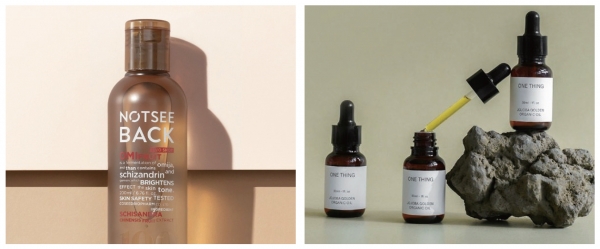
One Thing's product lines are each dedicated to a single raw material, such as cica centella asiatica, houttuynia cordata, vitamins, hyaluronic acid, and niacinamide, while ‘Mixsoon’ is a brand that emphasizes the principle of raw materials, making products with essential ingredients, such as beans and centella asiatica. ‘NOTSEEBACK’ is a brand launched by Coseed Biopharm, a raw material company, and, as the brand name suggests, features single-ingredient cosmetic products that do not require consumers to turn the product container to read the list of ingredients. Their products are either called one-shot, two-shots, or drop-ins depending on the concentration of raw materials, with the one-shot line using aloe, chickpea, vitamin tree, mung bean sprout, and malotus as ingredients, the two-shot line using schizandra chinensis and galactomyces, and the drop-in line using glycan, muco snail, and caviar collagen.
‘Formula K,’ a brand developed by GFC Life Science, a raw material company, specializes in customized cosmetics, with product lines consisting of products made using single ingredient extracted water and extracts from natural products, fermented products, biome, active formula, natural oil, as well as high performers.
‘The Potions,’ a smart customization brand, features various product lines, namely soothing, moisturizing, energy, and basic, that use centella asiatica, mugwort, jojoba oil, tea tree oil, calamine, azulene, hyaluronic acid, and peptides as their key ingredients.
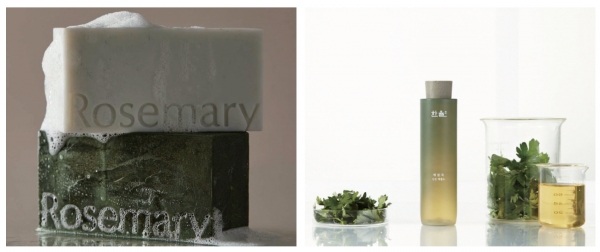
Upcycling, lab-grown … towards a sustainable future
Upcycled and lab-grown raw materials are also emerging thanks to their sustainability benefits. Upcycling refers to recycling raw materials, such as coffee grounds (coffee waste), beer grounds (beer waste), fruit by-products, and vegetable oil.
Innisfree launched a coffee upcycled product line made using discarded coffee waste extract and a Jeju beer upcycled line designed to help with scalp and body care using the effective ingredients found in beer residue. Aromatica launched a series of soap bars using tea tree and rosemary residue used in cosmetic manufacturing. Upcycling startup ‘Decant’ introduced ‘Vinnoir,’ a cosmetic brand that makes products using wine by-products.
LG Household & Health Care is developing raw cosmetic materials using discarded coffee grounds with the upcycling startup Urban Miner. The coffee waste raw material will be used as a sebum absorbent for cosmetics. Envy Bio Company, a raw material company, developed ‘PHYTO SILVER COLLA™,’ a plant-derived collagen raw material made from upcycled coffee bean waste. Upcycled agricultural products, such as carrots, potatoes, and water parsley, are also used in various ways in cosmetic manufacturing.
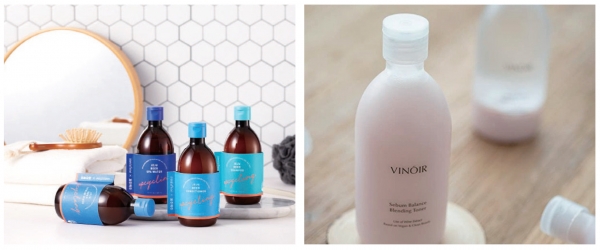
Lab-grown raw materials refer to raw materials grown in laboratories and can theoretically replace all natural raw materials. The trend is emerging as a sustainable alternative that can prevent the depletion of natural resources caused by climate change as well as environmental damage that may occur during the extraction process. In particular, recombinant proteins or peptides have replaced natural-resource extracts. Some examples of advanced biotechnology are NexGenBio's ‘biotoxic recombinant protein’ and Cellivery Living & Health's ‘R3 peptide.’ Natural Derma Project has introduced ‘Cica Bio Placenta Cream,’ a product made using its proprietary bioplacenta, a vegetable placenta, as a plant-based bio ingredient.
Edited by Shin Dae-wook (Beauty Freelancer)

